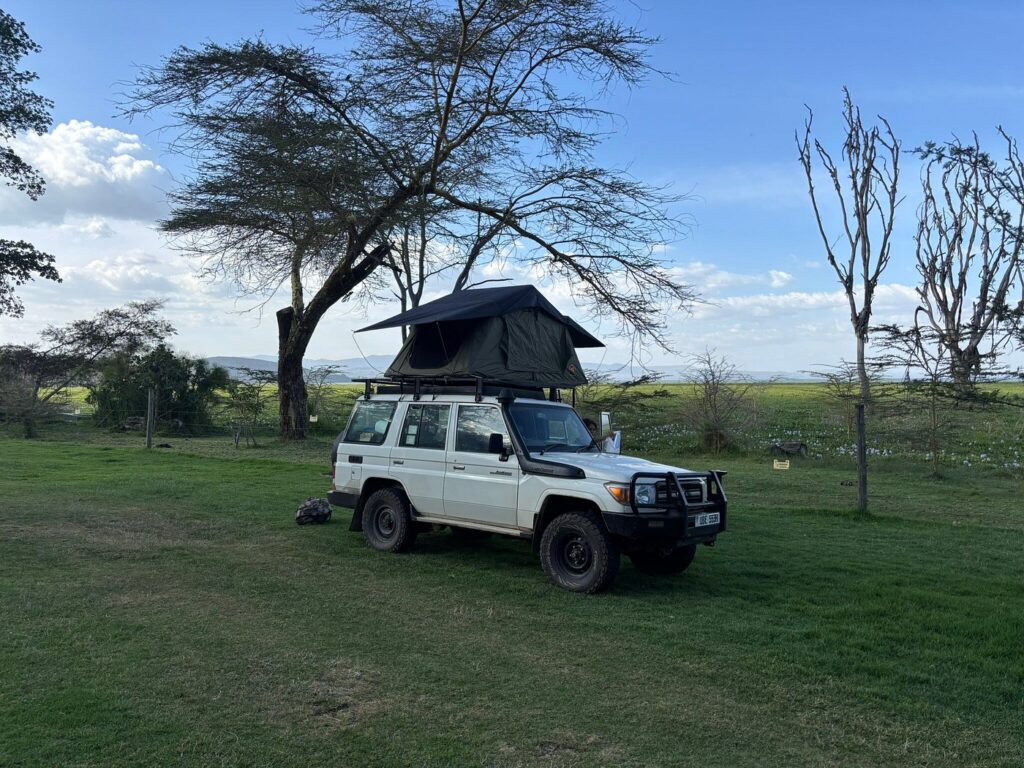Guide for a camping Road trip in Uganda.
Guide for a camping Road trip in Uganda, Uganda’s national parks are home to awe-inspiring landscapes and unforgettable natural beauty. Booking a car with roof top tent and taking a road trip to explore a national park is a bucket list item for many. But, just as with any outdoor adventure, it’s important to be well-prepared before you head off on your camping journey.
In this comprehensive guide, we’ll provide you with the must-know information and tips you need as you travel Uganda. We’ll cover everything from the different types of camping available to the best ten national parks
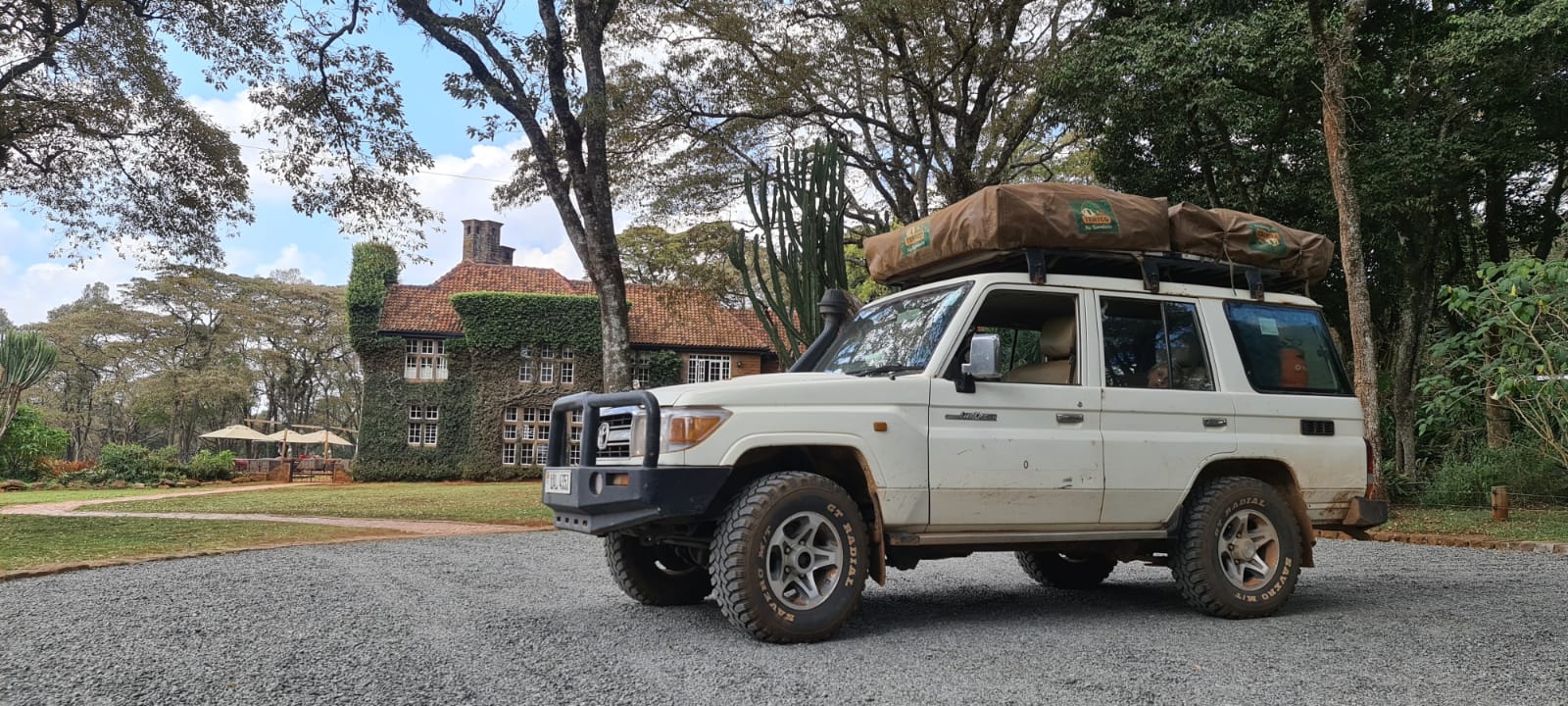
Whether you’re a seasoned road trip planner or it’s your first time in a camping safari, our tips and insights will help you create a memorable Uganda itinerary.
So, get ready to hit the open road, embrace the natural wonders of Uganda’s national parks, and create memories to last a lifetime.
For a successful camping trip in Uganda, be prepared with the right gear, including a quality tent, sleeping bags, and cooking equipment, and be aware of freedom camping rules, which require self-contained vehicles and responsible waste disposal.
If you are considering a camping holiday in Uganda, understanding how to be a good neighbour with other campers will definitely make your holiday more fun for everyone. We’ve put together a little guide to help you fit in well with holidaymakers at holiday parks anywhere around Uganda.
Leave no trace
Always adhere to the Leave No Trace principles by properly disposing of all waste, including grey water, toilet waste, and rubbish. Make use of designated dump stations for safe and responsible waste disposal. This way, we can all do our bit to care for Uganda’s environment and the special wildlife that call it home.
Check the weather
Uganda’s weather can be unpredictable, even in summer. Remember to check the weather forecast and be prepared for changes in temperature, rain, and wind. It’s also important to pack appropriate clothing and gear to stay comfortable and safe.
Take the relevant safety precautions
Before you head off into one of Uganda’s national parks, it’s vital to priorities your safety. Begin by researching hazards and safety precautions relevant to each park you plan to visit. Familiarise yourself with potential risks, such as landslides in some regions, flooding, or encounters with local wildlife.
Ensure you are equipped with the necessary safety gear, including a well-stocked first aid kit, sturdy footwear, and appropriate clothing for changing weather conditions. Additionally, consider carrying communication devices, such as a satellite phone or a personal locator beacon. By taking these essential safety precautions, you can enjoy your camping experience with peace of mind and fully embrace the natural wonders that Uganda’s national parks have to offer.
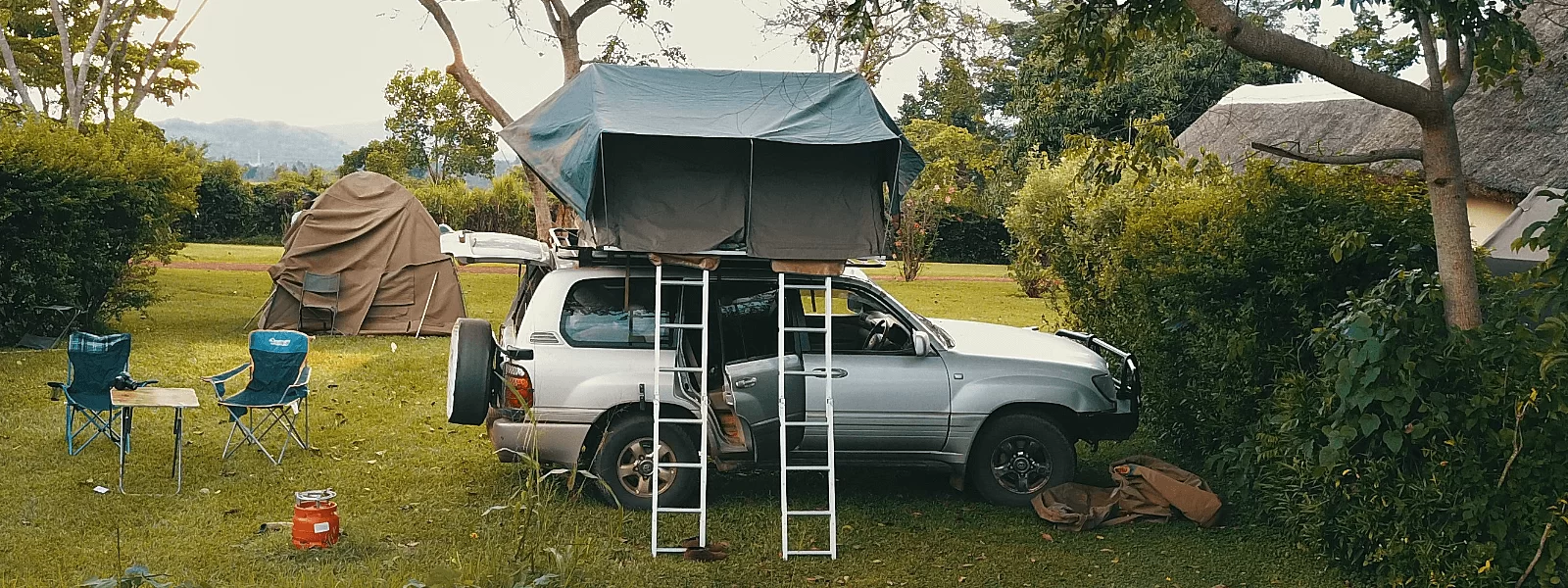
Test your gear.
Get to know how to set up a tent and how to pack it away. If it isn’t a new tent, check it’s still in top condition, and that you have all the necessary poles and pegs. If you’re taking a stove, clean and test that too. It’s better to identify missing equipment or any damage that needs repairing at home, rather than on your adventure.
Bring binoculars and cameras
If you’re investing in going on a camping safari in Uganda, make sure you go on the trip prepared with the right camera. While on safari, animals will sometimes venture very close to your vehicle but that won’t always be the case. Some animals, particularly rhinos and cheetahs, are more elusive. You may only get the chance to spot them from afar. To help with getting a better view of animals that are more shy, bring binoculars.
You’ll also want a camera that has good zoom capability so that you can capture animals that are further away. Many phones these days can zoom quite far. If you’re bringing along a DSLR camera, consider investing in a solid zoom lens for the trip.
Take good lighting.
While it may sound romantic to get about by the moon or fire light, the reality is you don’t want to be cooking, trying to find the toilet or hearing strange noises in the dark. The right camp lighting equipment makes a big difference. You can hang a head-lamp or torch from your tent ceiling to illuminate the whole tent. Also, be sure to keep one near the entrance so it’s easy to find at night in case you need to head out.
A headlamp is essential for a camping safari because many of the camps will have limited lighting after dark. You’ll use your headlamp to see while inside your tent, and to navigate around the campground after dark. While you can definitely use the flashlight on your phone for lighting, I found that using a headlamp was more comfortable because when wearing it, your hands are free. When you need to pack your bags inside a dark tent before the sun rises, you’ll be grateful for the headlamp!
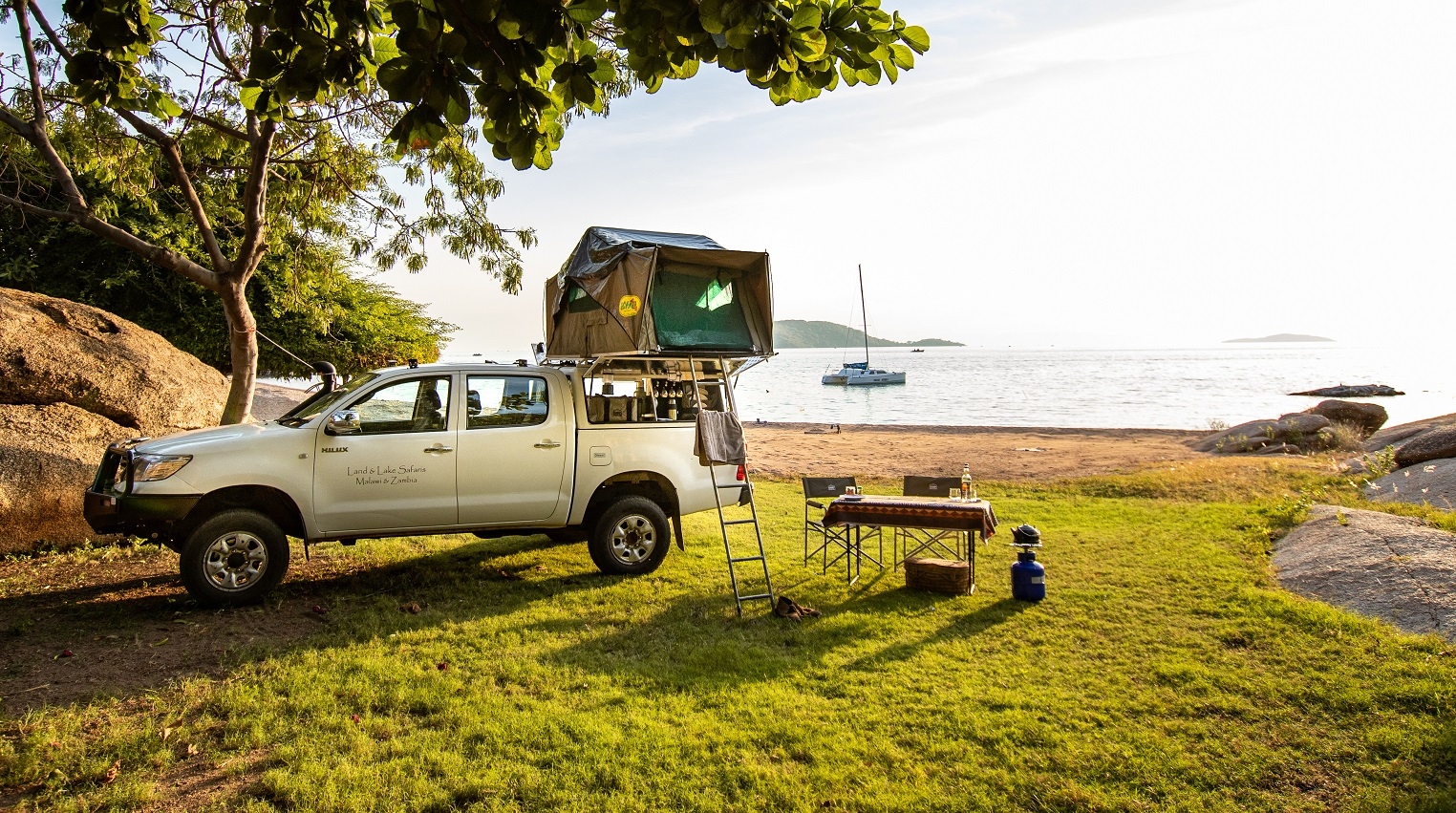
Prepare for Dust and Mud
While on a camping safari in Uganda you’ll be driving on mainly dirt roads. During the dry season, this means lots of dust, and during the rainy season, it means dust and mud.
Because safari jeeps typically have windows that open and a pop-up roof, a lot of dust and mud ends up inside the vehicle… and all over you.
To stay comfortable, you’ll want to prepare for this by packing hand wipes (or baby wipes), a microfibre towel for showering, and flip flops for showering.
Hand wipes are useful throughout the day if you’re feeling the need to clean up your hands or face.
A microfiber towel is easy to pack and dries quickly, and flip flops are comfortable to wear walking to and from the shower, and while showering.
Pack plenty of warm clothing
Uganda’s national parks are at various elevations, and so temperatures will change throughout your camping safari. Depending on the season, you’ll also need to be prepared for rain.
It’s best to pack layers with plenty of warm options like socks, leggings, and sweaters. Bring a lightweight good-quality raincoat.
Most days you’ll want to start out wearing comfortable lightweight pants, a t-shirt, sweater, and a light jacket. Throughout the day, temperatures will rise, and so you’ll likely remove layers as it warms up, and then layer back on as it cools down in the evening.
Think about the weather and temperatures before you head out to make sure you have a sleeping bag rated for the conditions you are likely to experience. Pack a few extra layers so you can grab a cosy fleece if it gets a little chilly after the sun sets.
Prepare for long drives
The main parks that are part of a camping safari itinerary in Uganda are Lake Mburo National Park, Queen Elizabeth national park, and Murchison falls National Park. The distances from Kampala to these parks are quite long, and you’ll also be on daily game drives that are typically 3+ hours long. The roads can be quite rough and so this adds driving time and daily drive times will vary depending on destination to another, but it’s safe to assume that you’ll be driving for several hours a day.
While the amount of driving sounds tiring, it’s all part of the experience. Even when driving between the parks, you’ll spot tons of wildlife. Prepare for these drives by doing a few stretches in the morning before hopping in the jeep, and downloading some travel podcasts to listen to.
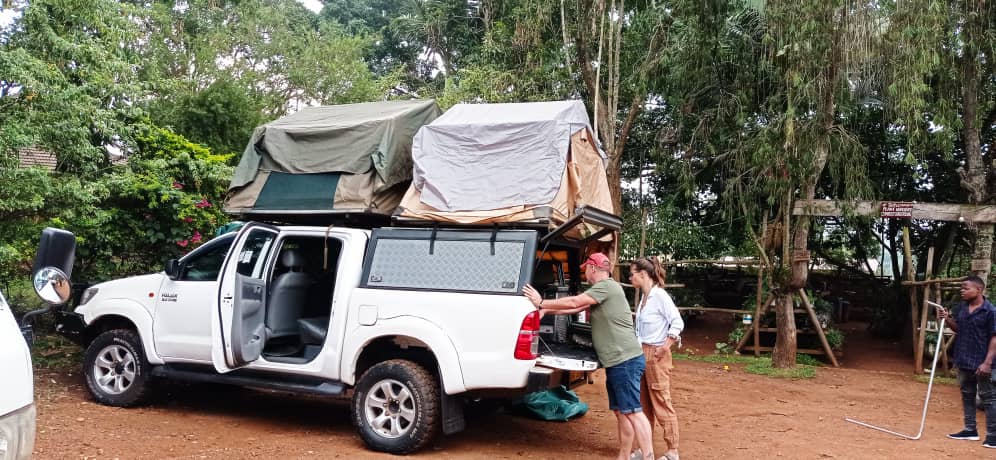
Take a power bank and few things
While on a camping safari there will be two options for charging your devices. Safari jeeps have charging outlets that can be used while driving. And, the campsites will usually have a few outlets for charging. These outlets are typically in a shared, public space like the bathrooms or cooking areas. Bringing a good-quality power bank is a nice back-up for charging your phone or camera in the moments where you can’t access an outlet.
Remember the small things like a lighter, hand sanitizers, dish brush, and soap. If you’re car camping, it’s worth throwing in a mallet for banging in tent pegs, and a brush and shovel for sweeping out your tent before pack-up. And if you’re bringing canned goods, don’t forget the can opener!
Don’t leave anything outside your tent
Don’t leave anything outside your tent overnight while camping in Uganda as these can be spoilt by wild animals during their night walk
Keep food in secure containers and coolers outside of your tent. You do not want to attract nocturnal visitors to your campsite, and definitely not into your tent. Some campsites have communal food boxes for you to store your food in securely overnight that are located a small distance from the camps. If you brought your car, pop your chilly bin and other food items inside before you snuggle into your sleeping bag.
Have cash on hand for snacks and tips
Most camping safaris in Uganda will include all of your meals, and so there won’t be much else to spend money on. But, there will be occasional rest stops where you can buy coffee, tea, and snacks. For example, the park entrance gates usually have a small canteen, and we were you can grab a coffee there.
You’ll also want to bring cash for tips. A camping safari involves a lot of logistics, and the days are long. Please plan to generously tip the team supporting your safari. This includes the lead guide, drivers, and cooks.
What you choose to give is entirely up to you.
Research your campsite.
Check what facilities are available. Are there showers, BBQs, a good amount of shade, and access to clean and safe drinking water? This will help you decide what to pack and what to leave at home.
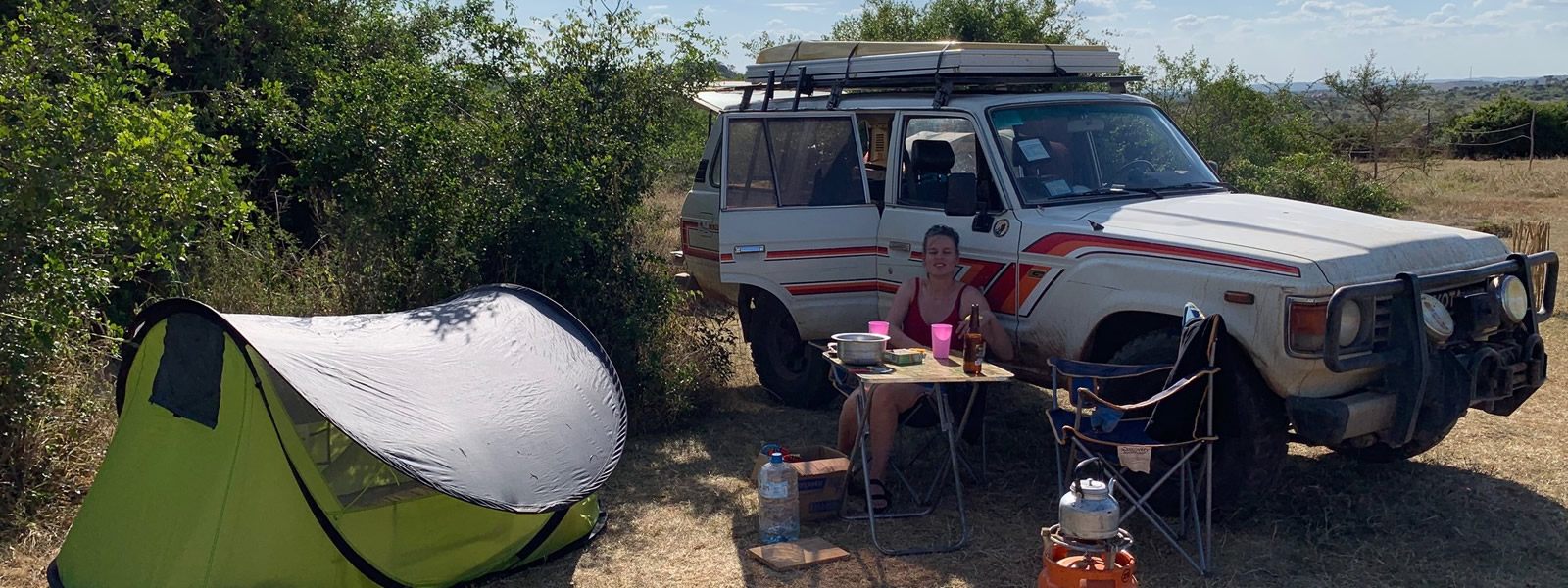
Purchase good-quality camping equipment.
Camping essentials that perform well in outdoor conditions and will last you for many camping adventures to come are what you’re after. Cheap equipment that damages easily and doesn’t provide comfort and protection will not make for a happy camper for long, and nothing is worse than your equipment falling apart halfway through your trip.
Another camping tip that may seem obvious, but nevertheless can slip from a camping novice’s mind, is to make sure you’re not camping on a river path, creek bed, or trench that could fill up with water during heavy rainfall.
Manage your fire.
Be aware of local fire regulations and weather conditions, use established fire rings and always keep a bucket of water handy. And remember: your fire isn’t truly out until you can sift through the ashes with your fingers. Never, ever leave your fire unattended. When you’ve finished, cover the dying embers and ashes with a deep coat of dirt or sand. You don’t want children or other campers accidentally walking over them in the dark. Build all campfires well away from trees and root systems – roots can catch fire.
Plan For a Rest Day After Safari
After several days of driving and camping you’ll be pretty tired, so you’ll want to plan to have a relaxing day after your safari. Not only is your body tired, but you’ll have had such an incredible experience seeing landscapes and wildlife, you’ll need a day to process it all!
